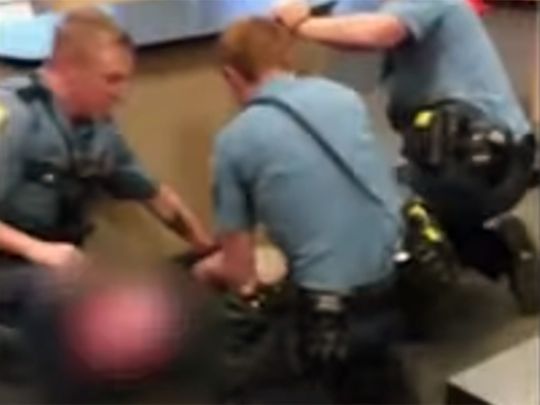
Minneapolis: The mother of a Minnesota girl whose videotaped arrest sparked an angry backlash on social media says her 13-year-old daughter has a mental illness and that officers were overly aggressive in handling her.
Prosecutors filed a juvenile delinquency petition on Friday charging the girl with fourth-degree assault in connection with her arrest in St. Paul last week. Police say the incident began after the teen violated a no-trespassing order, fled officers and ultimately resisted arrest.
But the girl's mother, Davida Conover, said her daughter was "basically treated like an animal." The Associated Press does not generally identify family members by name when doing so could identify a juvenile charged with a crime, but Conover spoke publicly and does not share her daughter's last name.
Video of the arrest recorded by a witness shows three white officers struggling to arrest the black teen as she screams and thrashes on the floor of a UPS store. Conover has accused the officers of racial bias.
While the juvenile petition in the case is not public, Minnesota's fourth-degree assault statute specifically mentions the assault of a police officer, which is a felony. The girl will be prosecuted in juvenile court.
After video of the Sept. 26 arrest surfaced on social media this week, St. Paul Mayor Melvin Carter called for an internal investigation, saying the video was "deeply disturbing."
Documents provided by the St. Paul Police Department show Officers Alexander Graham, Grady Sheehy and Charles Busch have an open internal affairs investigation against them. Graham is also subject of a second active internal affairs investigation.
Busch and Sheehy have no disciplinary actions in their personnel files. Records from the police department show Graham received an oral reprimand in 2017 for failure to prevent an accident. He has also received several commendations, including a medal of commendation and three life-saving awards for saving the lives of gunshot victims who were severely wounded in separate incidents in 2017 and 2018.
Police spokesman Steve Linders said he did not know if the three officers were aware of the girl's alleged mental illness, but she was well-known to the police department and these three officers had engaged with her before.
"Our officers go through extensive training," Linders said, adding the goal in an arrest "is always to do that with the least amount of force possible and if force is necessary, the expectation is it's reasonable and done with respect."
Linders said all St. Paul police go through training to work with people in crisis "and the focus is on doing everything possible to make sure everyone is safe in any given situation."
The head of the St. Paul Police Federation, Paul Kuntz, told the Star Tribune the officers acted professionally.
"I think they used the minimal amount of force that they possibly could to get her under control," Kuntz said. "There were no punches. ... Nothing of that nature."
Kuntz and the union's attorney did not return messages left by the AP. The officers do not have listed phone numbers and did not respond to a request for an interview left with the police department.
Sue Abderholden, executive director of the Minnesota chapter of the National Alliance on Mental Illness, said St. Paul police provide additional training to officers, including 40 hours of crisis intervention training. However, she said, that training is geared toward adults, not children and youth. She said in general, more focus must be given to responding to situations involving youth.
Michael Scott, director of the Center for Problem-Oriented Policing at Arizona State University, said a lot of police departments are training officers in how to recognize common mental disorders on the scene, and how they can adapt communication and physical restraints to be more effective.
Some departments have started an initiative in which caretakers voluntarily provide information about a person's special needs to police, so officers know what to expect in advance of a call. For example, officers might be told that an individual at a certain address reacts negatively to being yelled at or touched, and officers can adapt.
"That's not going to necessarily prevent some kind of violent interaction, but it helps," he said.
Linders, the police spokesman, said officers were investigating a report of juveniles trying to break into vehicles when they encountered the girl, and she resisted arrest and refused orders to put her hands behind her back.
Graham, one of the arresting officers, initially saw the girl in the parking lot of a gas station from which she had been banned because she had been "a chronic problem" there, Linders said. Her background included prior arrests for suspicion of assault, disorderly conduct, theft, auto theft and fleeing from police, he said.
As Graham approached the girl, she ran onto a light rail platform and the officer did not follow her because he was afraid she might jump onto the tracks, Linders said. As Graham responded later to the call about juveniles trying vehicle doors, he found the girl in a nearby UPS store, where a worker videotaped the arrest.












